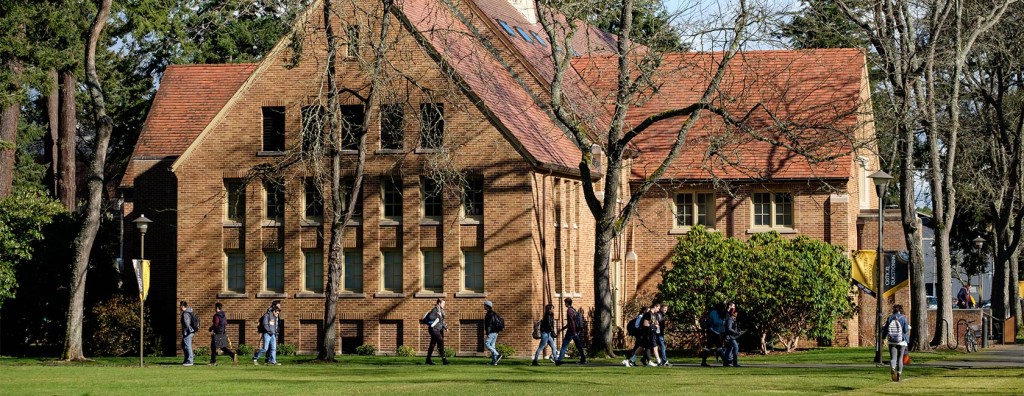Page 35 • (513 results in 1.613 seconds)
-
era (c. 3,000 BCE to c. 1500 CE), paying close attention to themes of cross-cultural encounter, the rise and fall of empires, and explorations over land and sea. We will explore global patterns of trade, technology, and expansion; the spread of ideas, religious traditions, and philosophies; the relationship between warfare, colonization, and the rise of the nation state; and how different cultural, social, and religious encounters have shaped the emergence of the modern world. (4) HIST 103
-
IHON Program & Courses 100-Level Courses During your first year, you’ll take two courses – IHON 111 in Fall Semester and IHON 112 in Spring Semester. These courses introduce you to crucial texts from various cultures, from ancient worlds to the present, interconnected ones. We don’t ask you to read religious texts like the Mayan Popol Vuh, philosophical texts like Platonic dialogues, or novels like Mario Vargas Llosa’s The Storyteller, because ‘that’s what you do in an honors program.’ Instead
-
Professor of History in 1958. He was chairman of the Department of History from 1963 until 1973, and served as faculty representative to the Board of Regents during the 1972-73 academic year. He was author of The Lamp and the Cross: Sagas of Pacific Lutheran University from 1890 to 1965 (1965) and Now or Never: Reflections of the Fullness of Time (1957), and contributed numerous articles to historical and religious journals. One of Dr. Schnackenbergs most frequently expressed wishes was that Pacific
-
Life 253-535-7200 stulife@plu.edu Gifts, bequests, grants, and the annual fund V-P for Advancement and University Relations 253-535-7177 advancement@plu.edu Work-study opportunities and student employment Student Employment 253-535-7459 stuemp@plu.edu Career options Career Development 253-535-7459 career@plu.edu Summer sessions Summer Sessions 253-535-7129 spacsummer@plu.edu Alumni activities Alumni and Parent Relations 253-535-7415 alumni@plu.edu Worship services and religious life at the
-
and is deeply engaged in scholarship through publications, conferences and work on steering committees and editorial boards. She has served the American Academy of Religion and many avenues of Lutheran scholars. She has presented papers and participated in the annual meeting of Lutheran Women in Theological and Religious Studies, the Association of Teaching Theologians, and the editorial board of Dialog: A Journal of Theology. She has presented papers at the International Luther Congress in
-

cosmopolitanism,” Director David Deacon-Joyner remarked. “His musical and verbal language was both elegant and earthy. His countenance was regal and fetching. He bridges the gap between the language of entertainment and religious expression. His style has often been compared to visual artists, with his orchestra being his sonic palette.” Ellington’s 1935 Reminiscing In Tempo, an elegy for his mother, gave us a glimpse of his faith expression through his music, as did a portion of his Symphony in Black from
-
need help.” The campaign officially kicked off Feb. 27 during HUMP. In an effort to become ingrained in the community, the campaign is collaborating with campus organizations on programming that promotes safer communities, such as last Monday’s “Can I Kiss You?” presentation about sexual assault. “What’s cool about this is that students are saying, ‘we want to do this,’” said Kate Fontana, ASPLU religious relations director. Fontana is spearheading the development of a peer education and training
-

. “Dr. Krise strengthened the ties between PLU and the 581 congregations of the Pacific Northwest Region 1 of the Evangelical Lutheran Church in America,” said the Rev. Rick Jaech, bishop of the Southwestern Washington Synod of the ELCA. “He also fostered greater interfaith understanding with the African-American church community in Tacoma, and by appointing Catholic and Jewish associate chaplains, and encouraging the creation of new student religious groups, including the Muslim Student Association
-
housing, South Hall and Harstad Hall (as outlined in the South Hall Alcoholic Beverages Policy and the Conference and Events summer policies), and for the purpose of approved religious worship. Possession and/or consumption of Alcoholic Beverages Under Age: The use or possession of alcoholic beverages is prohibited on campus and in the residence halls for any student under the age of 21. Empty alcohol containers and brewing equipment are similarly prohibited. Misconduct under the Influence
-
Studies at the Claremont Graduate University in Southern California. I will be conducting masters studies in management through the Drucker School of Management (M.A.- Management), and in religion through the Graduate School of Religion (M.A.- Religious Studies, or potentially M.Div.). These combined degrees may ultimately lead to a Ph.D., and will ideally serve well for my intended field of work in Religious Non-profits that do development work. Congratulations PLU Class of 2009. Read Previous What
Do you have any feedback for us? If so, feel free to use our Feedback Form.


